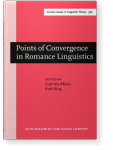Chapter 3
Definite determiners in Romance
The role of modification
The definite article in Eastern Romance (ER) is overtly expressed as a suffix on the noun. However, with objects of prepositions (Ps) the definite article can be null, unless the P object is modified, in which case the definite article must be overt. In order to account for this variation in the overtness of the definite article, I propose that definite Ds must undergo M-merge in ER and that the definite D is spelled out overtly only if D M-merges with a head that bears a definiteness ([def]) feature. ER languages display micro-variation with respect to which particular item in the DP can host the definite article, and with respect to whether the definite article in unmodified objects of Ps must, or simply can, be null. Micro-variation is accounted for by (i) the feature content of the Number head, and (ii) whether the M-merge rule applies strictly locally or not.
Article outline
- 1.Introduction
- 2.Existing literature
- 3.Theoretical background
- 3.1Features
- 3.2Prepositions
- 3.3Nominal phases and their peripheries
- 3.4The number phrase
- 3.5Adjectives
- 4.Proposal
- 5.Implementation of the analysis
- 5.1Num heads and the expression of definiteness
- 5.1.1Num1: [uN],[ua:]/EPP
- 5.1.2Num2: [uN],[ua:]/EPP,[uc:+]
- 5.1.3Num3: [uN],[uc:+]/EPP
- 5.1.4Num4: [uN]/EPP,[uc:+]
- 5.2Romanian
- 5.3Megleno-Romanian and Istro-Romanian
- 5.4Northern Aromanian (NAr)
- 5.5Southern Aromanian (SAr)
- 5.6To sum up
- 6.Conclusions
-
Note
-
References
